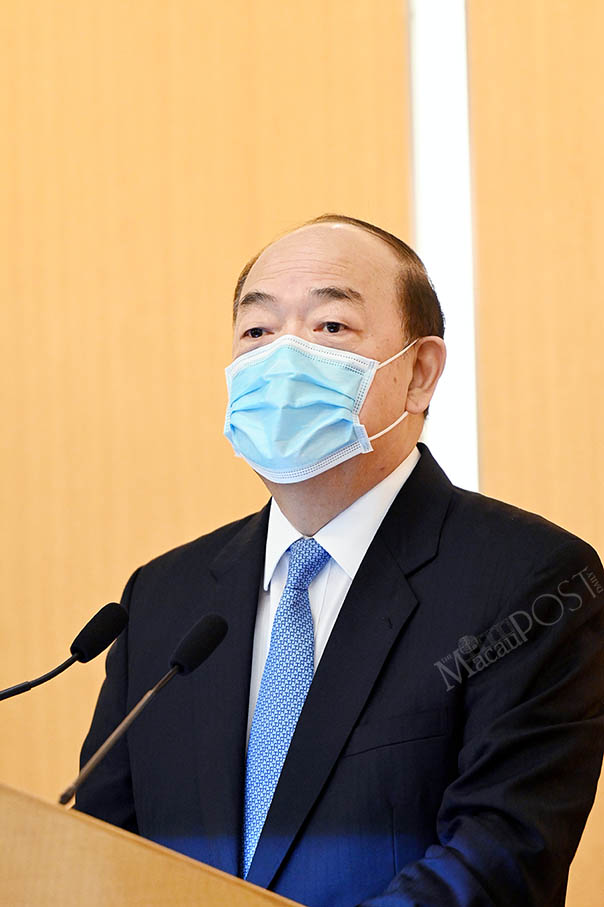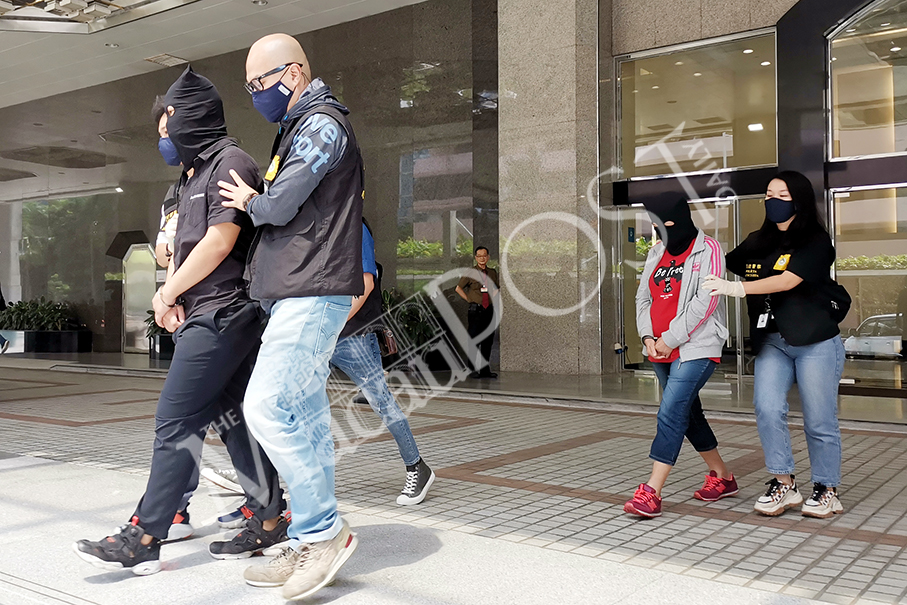Chief Executive Ho Iat Seng yesterday announced tightened entry measures to stem the spread of the novel coronavirus disease (COVID-19) in Macau, such as a ban on the entry of mainland, Hong Kong and Taiwan residents who have been to a foreign country within the past 14 days.
Ho announced three new entry measures, which took effect at 00:00 today, during a two-hour press conference at Government Headquarters yesterday morning.
The second measure Ho announced yesterday is the suspension of the transit of passengers at the local airport.
Under the third measure announced by Ho, all those who have been to Hong Kong or Taiwan within the 14 days prior to their entry into Macau must go into 14-day quarantine at a government-designated hotel (informally known as “quarantine hotel”).
Ho’s announcement of the three new measures came after the Hong Kong government announced on Monday that with effect from today, mainland, Macau and Taiwan residents who have been to a foreign country within the past 14 days are banned from entering Hong Kong.
The Hong Kong government also announced that starting from today, all those – both Hong Kong and non-Hong Kong residents – who have arrived in Hong Kong from Macau or Taiwan must go into 14-day mandatory quarantine there. The Hong Kong government imposed the same quarantine measure for those arriving from the mainland early last month.

Chief Executive Ho Iat Seng addresses yesterday’s press conference at Government Headquarters about the local government’s tougher entry measures. Photo: Iong Tat Choi
Ho said that after combining the new measures, which take effect today, together with the various measures which have been implemented by the local government since last month, starting from today, Macau residents who have been to a foreign country, Hong Kong or Taiwan within the 14 days prior to their entry into Macau must stay under medical surveillance for 14 days at a designated hotel.
Ho said that foreign nationals continue to be banned from entering Macau.
Foreign visitors have been barred from entering Macau since March 18, and the entry ban was extended to cover all foreign nationals – including foreign non-resident workers – on the following day.
Ho said yesterday that starting from today, mainland, Hong Kong and Taiwan residents who have been to a foreign country within the past 14 days are barred from entering Macau.
Ho said that starting from today, mainland, Hong Kong and Taiwan residents who have been to Hong Kong or Taiwan within the past 14 days are allowed to enter Macau but are subject to 14-day medical observation at a designated hotel.
According to previous government announcements, non-Macau residents who go into quarantine at government-designated hotels will have to pay a fee of 5,600 patacas, while Macau residents are exempted from paying the fee – meaning that the expenses for their stay during their quarantine period in the hotels is borne by the government.
Ho said that starting from today, mainland, Hong Kong and Taiwan residents who have not been to a foreign country, Hong Kong or Taiwan within the past 14 days are allowed to enter Macau, but are subject to a medical examination if arriving from a COVID-19-high-prevalence region on the mainland.
Since late last month, visitors who have been to Beijing, Chongqing, Guangdong, Henan, Shanghai or Zhejiang – the six provinces and municipalities on the mainland classified by the local government as COVID-19-high-prevelance regions – within the 14 days prior to their entry into Macau must undergo a medical examination which takes six to eight hours. The local government has set up two medical examination posts, one at the Macau Forum complex in Zape and the other at the Taipa Ferry Terminal. Border checkpoint arrivals are taken on designated buses to the medical examination posts for a medical examination. Those arriving on the peninsula are usually taken to the Macau Forum complex, while the remainder are taken to the Taipa Ferry Terminal.
Ho said that non-Macau residents who have visited Hubei province within the past 14 days or non-resident workers who have been on the mainland within the past 14 days can only enter Macau after obtaining a medical certificate confirming that they have not been infected with the novel coronavirus disease.
The first and second new measures – today’s entry ban on mainland, Hong Kong and Taiwan residents who have been to a foreign country within the past 14 days and today’s suspension of the transit of passengers at the local airport – are stipulated in an executive order signed by Ho and published in the Official Gazette (BO) shortly after yesterday morning’s press conference. The implementation of the third new measure – the quarantine measure for those arriving from Hong Kong or Taiwan – does not require the promulgation of a chief executive order.
Hotel quarantine ‘necessary’
During yesterday’s press conference, Ho thanked local students returning from overseas and their parents for their cooperation in the government’s epidemic prevention work which includes the returnees’ 14 days of mandatory quarantine at government-designated hotels. Ho said that the measure was necessary in order to protect the health of all local residents. Ho warned that if only one to three percent of the returning students were diagnosed with the novel coronavirus disease, it was probable that the highly infectious disease could spread in the community if they were not required to spend two weeks in a “quarantine hotel”. Ho said that the government apologises for any inconvenience caused to the students and their parents.
Health Bureau (SSM) officials have pointed out that Macau’s “second wave” of COVID-19 infections started on March 15. Since then 19 of Macau’s total of 29 cases have been confirmed. The city’s first case was confirmed on January 22. All of the previous 10 COVID-19 (the “first wave” patients) – seven tourists form Wuhan and three locals – have meanwhile been discharged from hospital.
‘Hard-won’ achievements
Ho underlined the “hard-won” achievements thanks to which Macau had not confirmed a new COVID-19 case for 40 consecutive days previously – between February 4 morning and March 15 night, adding that the city has, however, confirmed 15 newly imported cases between March 15 and Monday this week, while only 10 cases – seven cases imported by tourists and three cases the patients of which are locals – were confirmed in the “first wave”. Ho underlined that therefore the local government is now under more intense pressure in its fight against the COVID-19 threat during the current “second wave” than during the “first wave” as Macau was then facing risks only caused by arrivals from the mainland during the “first wave” while it is now facing risks caused by residents returning from Europe and elsewhere around the world.
‘Disappointed’ about gaming operators
During yesterday’s press conference, Ho said that while the local government thanked the city’s six gaming operators for their donations of anti-epidemic items such as facemasks to the public sector and private social organisations, the local government was “disappointed” about their unwillingness to allow it to temporarily use some of the hotels in their integrated resort complexes as “quarantine hotels”, despite the fact that the government will pay them for the service.
Ho said that while the local government has indicated that it prefers not to opt for hotels in gaming resort complexes as this would affect casino operations and other facilities such as restaurants, the local government has been facing increasingly severe difficulties in arranging more hotels that can be converted into medical surveillance facilities after more and more hotels are already being used by the government for medical surveillance purposes, due to the need to arrange for more and more residents returning from overseas – most of them students – to go into 14-days quarantine.
By last night, Macau had eight “quarantine hotels” providing about 2,100 rooms. Hundreds of Macau students enrolled overseas have returned home over the past week and hundreds more are expected to follow suit.
Ho noted that therefore the government has also contacted the city’s gaming operators for discussions on the possible conversion of some of the hotels in their integrated resort complexes into quarantine facilities, adding that none of them has, however, indicated their willingness to allow the government to use their hotels for quarantine purposes.
Ho said that, for instance, the government “could not contact” one large-scale hotel with 3,000 rooms, adding that it would be much easier for the government to manage a single hotel with 3,000 rooms as quarantine facility than many small hotels. “Despite the fact that the government will have to pay them [the gaming operators] for the quarantine service, they are still unwilling [to run quarantine facilities in their hotels],” Ho said.
Ho did not name the gaming operator who is running the 3,000-room hotel. Sands China’s Venetian in Cotai is Macau’s second-biggest hotel, boasting some 3,000 rooms, while the company's Sheraton hotel is the biggest with around 4,000 rooms.
Ho said that the COVID-19 epidemic is a “big test” for his government, which took office on December 20, 2019, but also a “big test” for the six gaming operators. He reminded the operators of the need to shoulder their social responsibility which he said is much more important than publicity.
“Everyone should be clear about what defines social responsibility, which is not about publishing publicity articles in newspapers and donating something. Instead, social responsibility is a company’s willingness to jointly tackle and shoulder issues which occur in civil society with other segments in society,” Ho said.
‘No revenge’
The chief executive also urged the media not to describe the measures announced yesterday as a kind of “revenge” against Hong Kong, which has taken a string of similar measures that affect Macau, such as by suspending its ferry links with Macau without informing the local government in advance, and by rolling out new measures that take effect today.
Ho said that the Hong Kong government is assisting Macau in its anti-COVID-19 measures such as by allowing local students returning from overseas to transit at Hong Kong’s airport en route to Macau by special bus, urging the media to focus on paying close attention to the helpful measures that the Hong Kong government has been conducting for Macau.
Ho also underlined that the government has rolled out a string of financial support measures for local small- and medium-sized enterprises (SMEs) due to the impact of the COVID-19 epidemic, adding that the government will not launch additional financial support measures for local SMEs. Ho, who was a businessman for decades until he became Macau’s chief executive on December 20 last year, pointed out that running a business always involves risks, adding that it would not be right for the government to cover their losses.







